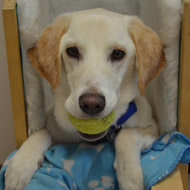
Pluto suffers from rare condition called mega-oesophagus
An unlikely item of furniture has been used by vets at Battersea Dogs and Cats Home to help a puppy survive a life threatening illness.
Labrador Pluto arrived at Battersea Brands Hatch in February as a severely underweight puppy. Vets were concerned when Pluto continuously brought back up his food, and tests revealed that he had a rare condition called mega-oesophagus.
This congenital condition meant the muscles in his oesophagus did not work, so anything Pluto chewed could get stuck in his throat and be fatal.
To solve the problem, vets decided to construct a Bailey Chair - a special high chair for dogs - that allowed Pluto to be fed upright, allowing the food to reach his stomach. He then has to stay upright for 10 minutes after eating so that his food does not come back up.
Veterinary surgeon Shaun Opperman explains: "It’s all about gravity when you feed Pluto, he needs to be fed upright and have all his food in one go. At Battersea we put water in the food to hydrate him because he couldn’t even have a drink – it’s a fairly long process.
"Anything can get stuck in his oesophagus and people need to be really vigilant – even if he eats a small piece of food or fluff off the floor it would put back his progress.”
Pluto has now found a loving home with Alan and Deborah Scoones in Oxfordshire. Alan said: “Our daughter Chloe works at Battersea Brands Hatch and fostered Pluto and we had the chance to meet him. We fell in love with him and wanted to re-home him, so Chloe taught us all we needed to know about his condition.
"Now we have a good routine at home with feeding and we all take turns four times a day to give him a meal. Pluto knows to get straight into his chair and backs in to it all on his own – he sits there waiting for his food to be brought over! He scoffs it down and seems very happy.
"It’s a small price to pay to have such a perfect dog in our lives. It’s great that Chloe can still see Pluto when she visits us, especially after she cared for him and did so much work with him at Battersea.”
Image (C) Battersea Dogs and Cats Home



 The latest
The latest